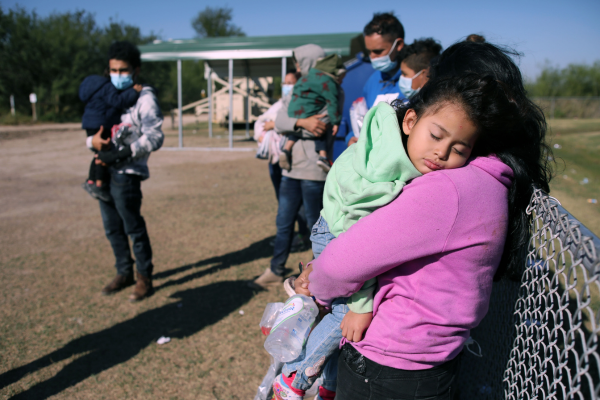 At a time of record global displacement, governments everywhere are focused on controlling their borders. Too often, including here in the US, respecting the right of persecuted people to seek asylum is a secondary or even lower-level concern.
At a time of record global displacement, governments everywhere are focused on controlling their borders. Too often, including here in the US, respecting the right of persecuted people to seek asylum is a secondary or even lower-level concern.
In fact, there are straightforward steps that the Biden administration could take—right now—to manage the border while respecting fundamental human rights. How do we know? We’ve seen them firsthand. Here’s what happens to asylum seekers at the border, and what could happen that would maintain order while ensuring nobody is returned to persecution and harm.
1. Allow people to apply for asylum at land ports of entry.
Under current border policy, it is difficult if not impossible for people to seek asylum at an official land port of entry. So, they walk miles through the desert or swim across the Rio Grande, hoping to find a way to ask for asylum once they get here. Policies that give people seeking safety no choice but to risk their lives are not effective or humane policies. The US government should allow people seeking asylum to enter the United States at land ports of entry. To do this effectively, ports of entry must be robustly funded and staffed, so that efficient and humane asylum processing does not interfere with other functions.
After immigration officials process people in an orderly manner at ports of entry, they should transfer people who need support to local organizations and communities that provide temporary shelter and basic humanitarian assistance. This coordination would prevent families from languishing in overcrowded and costly immigration facilities or on the streets. It would also make the government’s job of migration management easier by moving people through border facilities quickly.
We saw this solution succeed when more than 20,000 Ukrainians fleeing Russia’s invasion successfully sought safety at a port of entry in a single month. This pathway prevented Ukrainians from needing to enter the United States through more dangerous routes.
2. Fund services that offer information and support for the newly arrived.
At the border, US officials screen and process people seeking asylum and then, in most cases, release them to pursue their immigration cases. Border communities have provided hospitality to new arrivals for decades, offering hot meals and a place to rest before individuals continue their journey. They help people contact families and friends who are waiting for them and coordinate their travel to reunite. These support services are critical to meeting people’s basic needs and enabling them to move on from the border quickly.
Federal funding through the Shelter and Services Program supports these community services. With further investment, border communities can make their welcoming work more sustainable and flexible to adapt their services to constantly changing migrant demographics.
These services continue to be critical far beyond the border. Nonprofit organizations, faith communities, and local governments across the country are helping new arrivals enroll children in school, apply for asylum and work authorization, secure housing, and find their first job. This is good for migrants and good for the communities in which they settle. Congress and the Biden administration must invest in these critical services that help new arrivals support themselves as quickly as possible. In addition to resources, the administration should implement a whole-of-government approach to coordinate these services and support local communities that are leading the way in ensuring smooth integration of newcomers.
The Women’s Refugee Commission has seen firsthand how communities welcome families and individuals seeking asylum. We have visited all parts of the southwest border and witnessed shelters that support hundreds of people daily. We have also visited cities like New York and Chicago, where wraparound services help people find self-sufficiency and stability.
3. Treat children like children, always.
Many children arrive at the border alone. Like all children, they need education, a nurturing and supporting home environment, and to be kept safe.
The government’s obligation to keep migrant children safe continues after reunification with sponsoring families. One growing risk to children is labor exploitation. Unscrupulous employers put children to work illegally in dangerous jobs, working long hours that take them out of school, all enabled by the financial insecurity and marginalization of the children’s families. For the past year, we have seen how unaccompanied children are especially vulnerable to such criminal actors.
To prevent unaccompanied children from being exploited, they and their families need resources: secure housing, food, access to medical care, financial support for everyday needs. The best options for this involve schools – which already provide food, a place to go for children and adults alike, and community resources. The Biden administration can fund schools to do this work directly.
Authorities at every level of government must ensure that older children who choose to work are in jobs that are appropriate and safe, and must ensure rapid and decisive interventions when problem employers are identified. To hold companies accountable for child-labor exploitation, the Department of Labor should expand its enforcement capacity and publicize violators. Congress should also increase fines for child-labor violations, which are currently so negligible as to have little meaningful impact.
These solutions are critical pieces of a bigger puzzle. Ultimately, addressing today’s displacement and migration realities, beyond building a safer and more peaceful world for everyone, will mean opening more pathways for migration and protection that spare people from making dangerous journeys.
Only Congress has the authority to modernize our immigration laws. Until then, we urge the Biden administration to take these steps to bring more order to the border and communities welcoming newcomers across the country while upholding the human right to seek safety from persecution.

